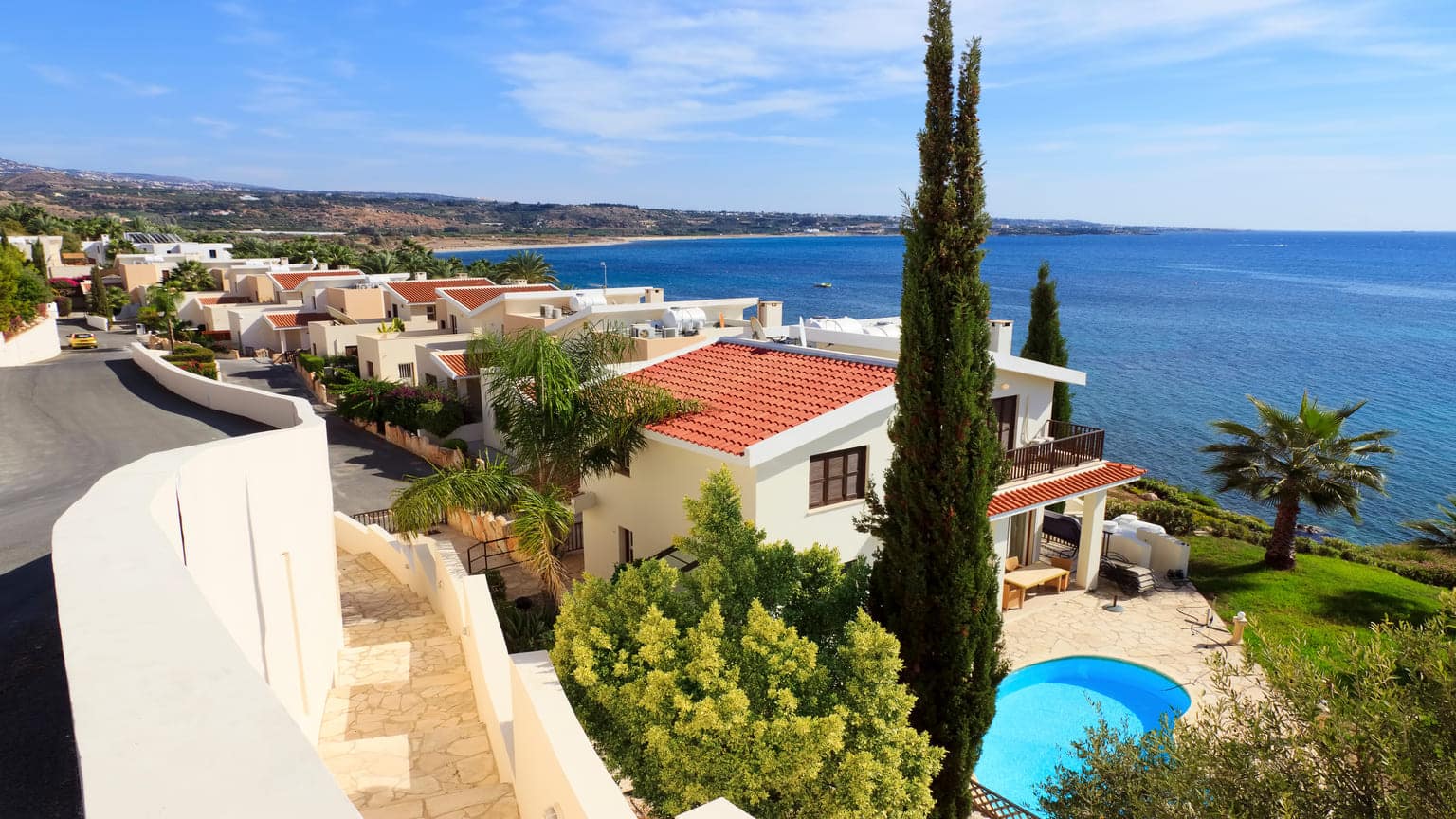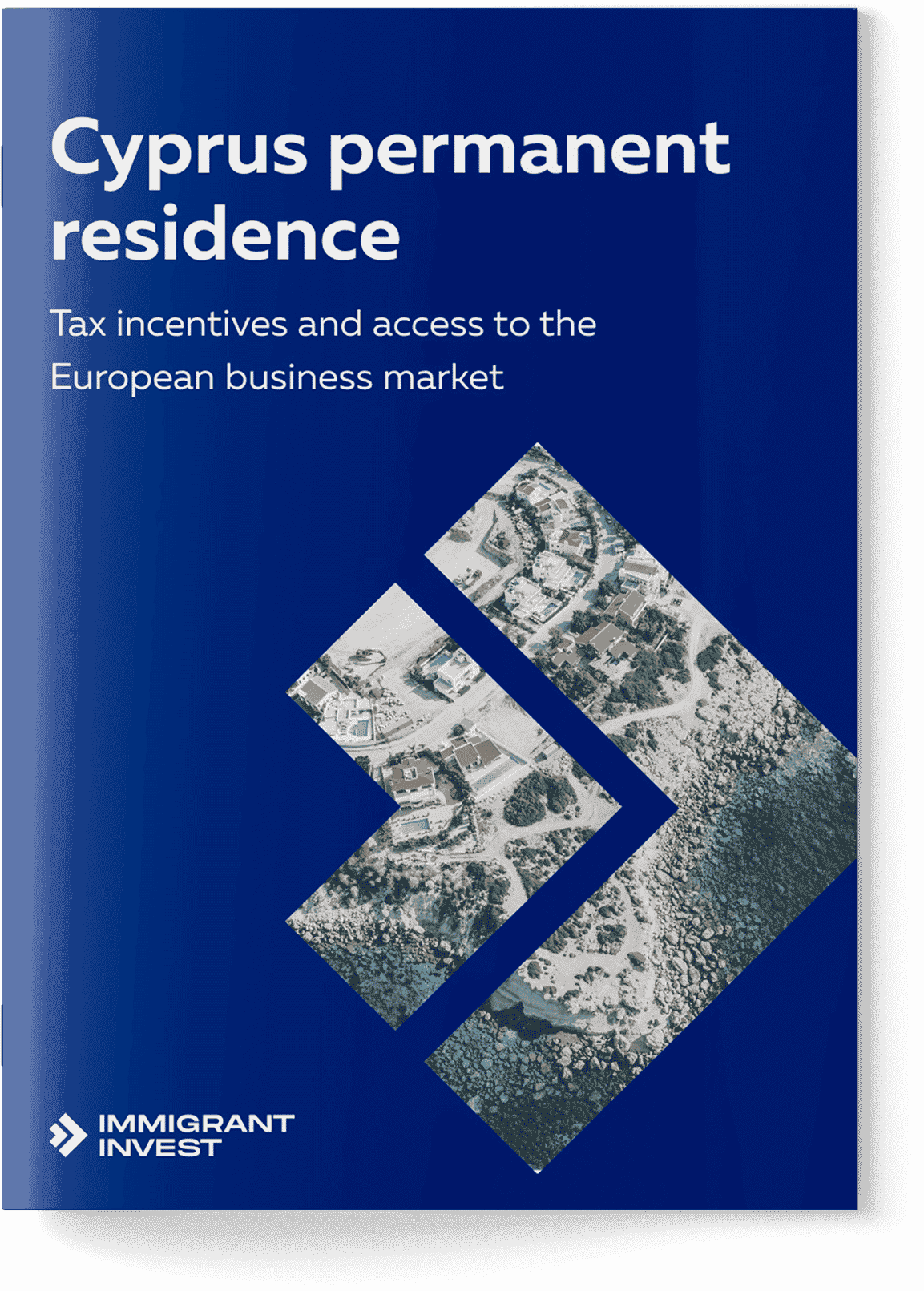Overview of property tax types in Cyprus
Cyprus offers non-EU citizens a fast pathway to obtaining permanent residence by investment. It takes slightly over three months on average and an investment of at least €300,000 in real estate or securities.
Those who choose to invest in real estate in Cyprus have to pay property taxes. There are three types of taxes related to buying property in Cyprus: VAT and stamp duty for the primary market and property transfer fee for the secondary market. There are also expenses associated with owning a property.
Those who already own property in Cyprus and want to rent it out may be liable to pay a rental income tax. Property sellers have to pay a capital gains tax.
Residence by investment program is a way to prepare a safe haven in Cyprus
VAT in Cyprus is set at the standard rate of 19%. Primary real estate in Cyprus is subject to VAT, whereas property bought on the secondary real estate market is VAT‑free. However, purchasing residential real estate on the secondary market is impossible as part of the Cyprus Permanent Residence program.
The VAT rate may be reduced to 5% if the property is the first for the investor and they plan to live there. The reduced rate only applies to smaller houses: up to 130 m², with a maximum value of €350,000. The total buildable area must not exceed 190 m², and the total transaction cost must be no more than €475,000.
If the investor enjoyed the reduced 5% VAT but didn't use it as the place of residence in Cyprus or sold it within 10 years, they must compensate for the difference. For example, if after 6 years the investor buys a new house, they must reimburse the 14% difference between the standard 19% VAT and the reduced 5% VAR for this period.
Stamp duty depends on the property value and ranges between 0% and 0.2% of the total transaction cost. It is paid for property bought both on the primary and secondary market.
The amount of the tax depends on the value of the property:
- 0,15% for property worth between €5,000 and €171,000;
- 0,2% for property worth more than €171,000.
This tax must be paid within 30 days after the contract's conclusion.
Property transfer fee is only paid if an investor buys real estate on the secondary market. It ranges between 3% and 8%, depending on the property market value:
- 3% for property worth up to €85,430;
- 5% for property worth between €85,430 and €170,860;
- 8% for property worth more than €170,860.
The tax can be reduced if the property has several owners — the taxable amount is distributed among them proportionally.
Immovable Property Tax is not paid after it was abolished in 2017 by the House of Representatives.
Property rental income may be paid if you already have a property in Cyprus and want to rent it out. The tax is paid on a progressive scale and varies from 0% to 35% of the annual profit:
- 0% for up to €19,500 of yearly income from renting property;
- 20% for €19,501—€28,000;
- 25% for € 28,001—€36,000;
- 30% for €36,001—€60,000;
- 35% for over €60,000.
Capital gains tax is set at 20% and is paid for both residential and commercial within a month of the moment of the sale.
Inheritance tax is not in Cyprus.
Property maintenance fees. These expenses include payments for water supply, electricity, refuse collection, sewerage, etc. According to Numbeo, the monthly utilities for an 85 m² apartment are €181.
Insurance costs about €40 per month, one of the lowest in Europe. The insurance price depends on the type of property, its total area, and other factors.
How to buy property in Cyprus step-by-step
Potential investors can choose a property for purchase remotely.
Immigrant Invest offers a reliable database of property items at different stages of construction. We can do a room tour and tell you more about each property. Immigrant Invest does not charge a commission on the property on our website.
A potential investor books a property item by leaving a deposit — 10% of the property’s market value. The money is transferred to the seller’s escrow account; a lawyer assists the deal throughout.
At this stage, an investor can start collecting documents for obtaining permanent residence.
Within one month, the property of choice undergoes a check for any possible restrictions.
The buyer and the seller agree to the conditions of the contract.
The lawyer pays the stamp duty and submits one copy of a sales contract to the Department of Lands and Surveys. After this step, the new property owner is prohibited from affecting the deal and the property. For example, they cannot rent the property out or rebuild it.
After signing the contract, the buyer pays the remaining 90% of the property price and the VAT. The money goes to the lawyer’s escrow account.
After the contract is signed and all the money is paid, the migration service starts Due Diligence on the investor and the family members if they are included in the application.
Obtain the title deed after successfully passing the Due Diligence.
An Immigrant Invest lawyer submits the required documents and the investor’s application to the Civil Registry and Migration Department of Cyprus.
The average wait time is over three months.
After the approval of the application, the investor and their family must visit Cyprus within a year to submit biometrics and get Cyprus permanent residence cards.
Examples of total property costs with taxes
Option 1: budget apartment as your only home in Cyprus
A residential property worth €220,000 with a total area of 64 m² in a prestigious district of Paphos. Provided this is the first property for an investor and they plan to live there, the VAT will be at the reduced rate of 5, 19%.
| Property cost | €220,000 — €400,000 |
| VAT | €11,418 — 20,760 |
| Stamp Duty | €440 — 800 |
| Total | €231,858 — 421,560 |
Option 2: Luxury option with a big area
A villa with a panoramic seaside view worth €1,700,000 in Limassol with a total area of 234 m². The VAT rate for this kind of property is 5,19% as the total cost exceeds the permitted amount for the reduced VAT.
| Property cost | from €1,700,000 |
| VAT | €88,230 |
| Stamp Duty | €3,400 |
| Total | €1,791,630 |
Option 3: Commercial property worth millions
A commercial property worth €3,100,000 in a business quarter in Paphos at the construction stage with a total area of 901 m². The VAT rate for this kind of property is 5, 19%.
| Property cost | €3,100,000 |
| VAT | €160,890 |
| Stamp Duty | €6,200 |
| Total | €3,267,090 |
Summary of the article
- Investing in real estate in Cyprus can grant you permanent citizenship in a country member of the EU. The minimum investment amount is €300,000.
- Investors in real estate have to pay VAT and stamp duty. The standard VAT in Cyprus is 19% but may be reduced to 5% on certain conditions. The stamp duty depends on the property’s price, the maximum amount is 0,2% of the property cost. The property transfer fee is paid for real estate bought on the secondary market. There's no immovable property tax in Cyprus.
- Homeowners in Cyprus have to cover expenses related to maintaining a property. A utility bill for an 85 m² apartment is around €181. Cyprus insurance is one of Europe's lowest, around €40 monthly.
- Real estate owners who rent their property out are liable to pay a property rental income tax that ranges from 0% to 35%, depending on the annual income. Property sellers in Cyprus would have to pay a capital gains tax set at 20%.
Frequently Asked Questions
The standard VAT rate in Cyprus is 19%, but investors can sometimes enjoy a reduced VAT of 5% that applies to smaller houses bought on the primary market. It must be the first property in Cyprus for the investor, and they plan to live there.
The property item must be smaller than 130 m² with a maximum value of €350,000. The total buildable area must not exceed 190 m² and the total transaction cost must be below €475,000.
The immovable property tax in Cyprus is not paid as it was abolished in 2017.
Yes. Cyprus offers a mild Mediterranean climate, high standard of living, excellent education and healthcare. The average life expectancy in Cyprus is 81 years. Buying property in Cyprus is a perfect investment in your future and a chance to obtain a free-pass to the Shengen zone.
The capital gains tax in Cyprus is fixed and equals 20% from the total sum of the transaction.
This largely depends on the price of the chosen property and its size. In the best case scenario, you’ll pay no more than €400,000 with taxes for a new home in Cyprus.
If you invest €300 000 in the property in Cyprus, you are granted permanent residence for life. After living on the island for five years, you can apply for citizenship.






